We know that businesses are feeling the pressure to tighten their belts in the midst of recession and inflation. As you download your expense and budget spreadsheets, the marketing line item starts to look like a negotiable expense.
But history and research show us that slashing your marketing budget may be a costly mistake.
In fact, many top-performing companies are investing more in marketing during recessions.
In this article, we’ll share compelling reasons why businesses (like yours) should try and resist the temptation to cut your marketing budget and focus on optimizing your marketing strategy to do more with your same investment.
B2B Marketing in Uncertain Times
The current economic uncertainty is likely to be here for a while.
MediumGiant writes: “Some predict a global recession that lasts into 2024. Others expect the economy to flirt with recession without actually crossing into it. Still others predict a moderate but protracted recession that extends far beyond the eight-month-long downturn of 2001. Who’s right? It’s anybody’s guess.”
If that’s the case - how do you plan to tackle your marketing budget in 2023, 2024, and beyond?
B2B Marketing Budget Trends in a Recession
The impacts of cutting your B2B marketing budget in an uncertain economy can lead to a big hit on your bottom line.
According to research summarized by the Harvard Business Review, evidence overwhelmingly suggests that companies that don’t reduce, but instead increase their marketing budgets during recessions, actually receive proportionally higher sales than those that lower their marketing spend or don’t spend any at all.
In Roland Vaile’s seminal Harvard dissertation, he compared the sales results of companies that stopped ads completely, increased ad budgets, and decreased ad budgets. His findings have held true for more than 100 years of recessions.
His research showed that companies that reduced their marketing budgets in uncertain times saw around a 7% drop in overall sales, compared to a 20% increase in sales for those companies who invested more in marketing compared to their pre-recession sales.
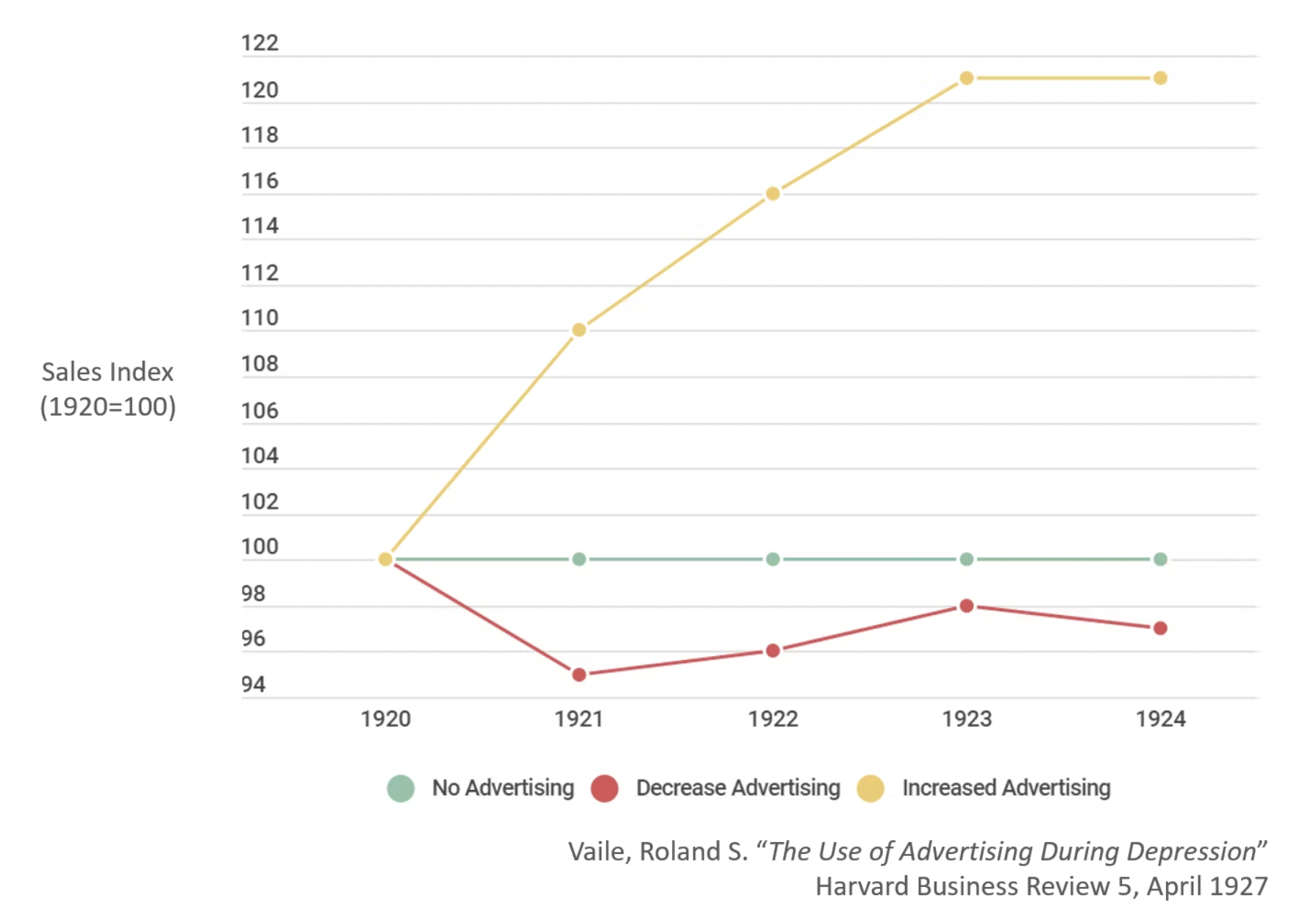
But this data is from 1927 - nearly 100 years ago. Does this theory stand the test of time?
Further research says yes.
Stephen King, the notorious advertiser, working with WPP scholar Alex Biel showcased this same exact theory in 2003.
In a summary analysis by Marketing Tactics, the author reiterates the importance of increased spending during the recessionary period.
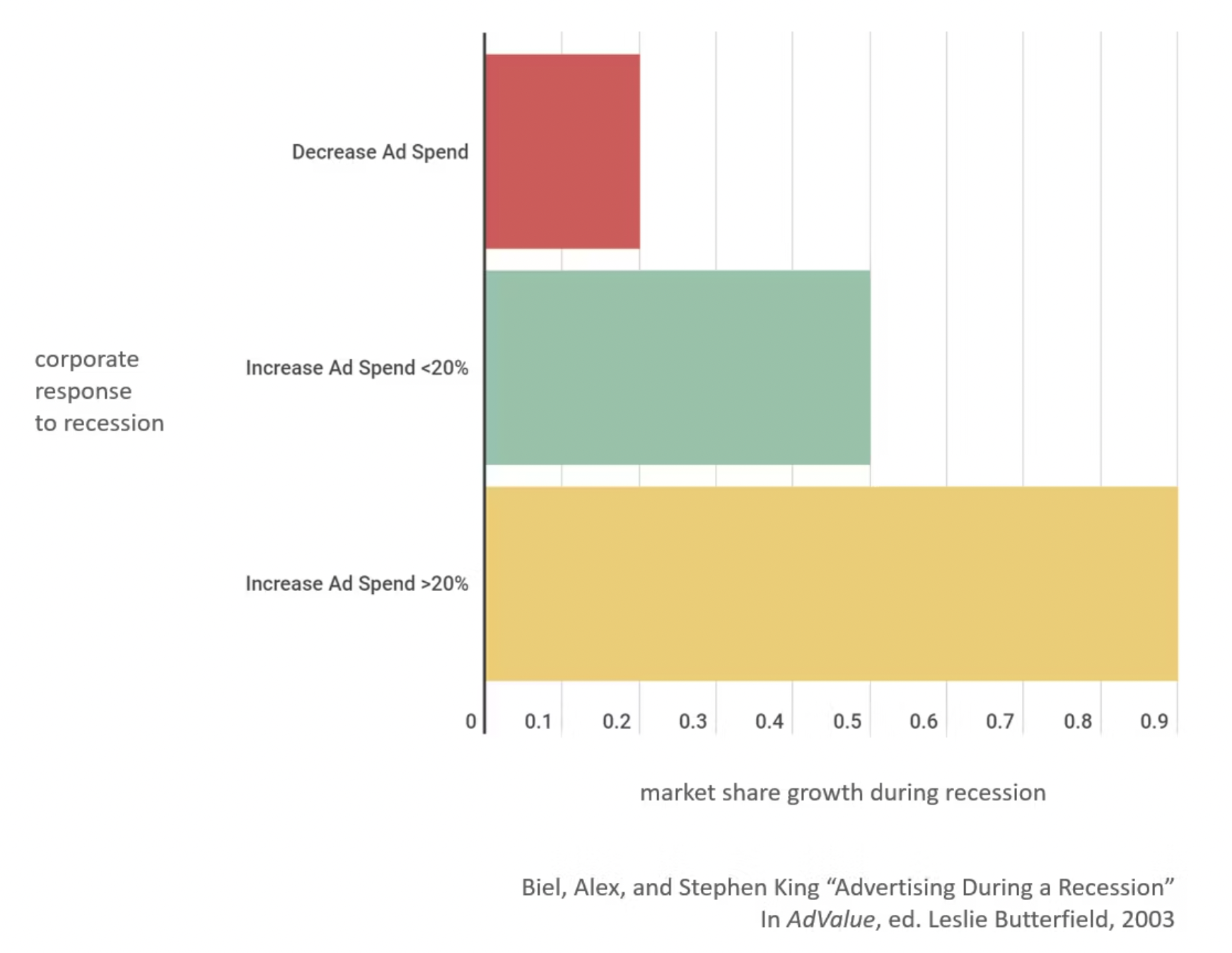
“Biel and King note that these share gains slowed down dramatically once the recession ended. Like a game of musical chairs, the time to move about is while the recessionary music is playing in the background. Once that music stops and the economy improves the chance to improve your position curtails significantly. In Biel and King’s research most of the market share gains were achieved during the recessionary period and then maintained during the growth that followed.”
5 Reasons to Increase Your B2B Marketing Budget in a Recession
In 2023 and beyond, there are enormous opportunities for your B2B business to embrace digital marketing strategies to not only drive more sales and expand your market share, but to improve customer relationships and see long-term benefits.
1. Increase Your Brand Awareness
Your brand awareness is more than just who recognizes your logo while scrolling. Your brand's presence is crucial to the success of your business. And brand awareness can be even more critical in uncertain times.
That’s because businesses aren’t the only ones tightening their belts during a recession. Consumers also need to make more thoughtful decisions about where they buy from - and when.
When you cut your digital B2B marketing budget during a recession, you make it even harder for potential customers to find you online.
Not to mention, less marketing investment means you aren’t able to effectively tailor your brand’s messaging to the harder times.
You may think that by reducing your spending in a recession, you’ll at least be able to maintain the brand visibility you have today. But that’s simply not the case according to numerous studies.
Just take a look at these stats collected by Marketing Moves:
“Buchen Advertising tracked advertising budget vs. sales trends for the recessions of 1949, 1954, 1958 and 1961. They found that sales and profits dropped at companies that cut back on advertising. After the recession ended, those same companies lagged behind the ones that maintained their ad budgets.”
Decreasing your spending may lead to lost brand visibility which may take years and a significantly higher future investment to regain.
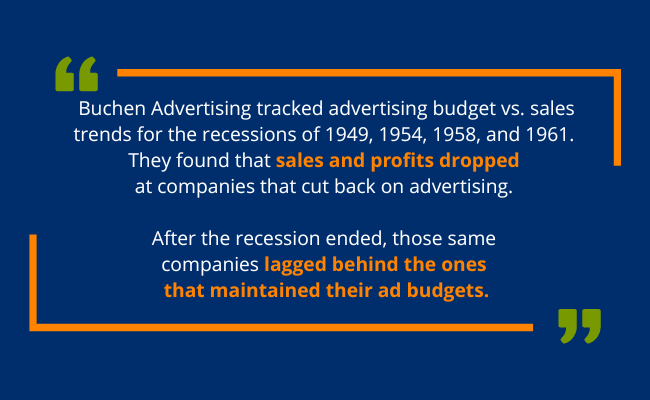
2. Capitalize on Your Now-Reduced Competition
If your first instinct in seeing the daily news was to reduce your B2B marketing budget - you’re not alone. Many businesses will slash their marketing investments in order to protect that volatile bottom line.
But while you’re rolling back your spending, your competition may be swooping in to take up that valuable marketing share of real estate.
Savvy business leaders (like you?) will see reduced competitive spending for the opportunity it is.
If you maintain or increase your marketing budget, you’ll be well-positioned to take up that market share.
Not to mention, your improved positioning only stands to help you once the market recovers.
And these results aren’t speculative.
The McGraw-Hill study of the 1982 recession showed that “in 1985, three years after the recession, companies that kept advertising through the dark days had sales that were up 275 percent from 1980, the base year, while those that had cut their budgets were up only 19 percent.”
3. Refocus on Your Customer Relationships
Maintaining your marketing budget and efforts doesn’t just help you take up more market share to find new customers. It helps you continue to engage and nurture your existing customers as well.
Multiple studies have shown that acquiring new customers is significantly more expensive than retaining and existing ones.
In fact, in 2006, a study showed that 56% of marketing budgets had been dedicated to nurturing existing customers.
If you’re looking to get more short-term ROI from your marketing efforts, why not look into a customer loyalty campaign?
4. Adapt to Changing Customer Behavior
Consumer behavior tends to shift during recessions, with people becoming more value-conscious and actively seeking cost-effective solutions.
If they’re getting hammered with the same luxury advertising from the pre-recession era, you’re likely to lose potential customers.
With your maintained spending, launch a renewed messaging campaign to focus more centrally on your value proposition. Consider how you can adapt your products and services to meet changing consumer needs.
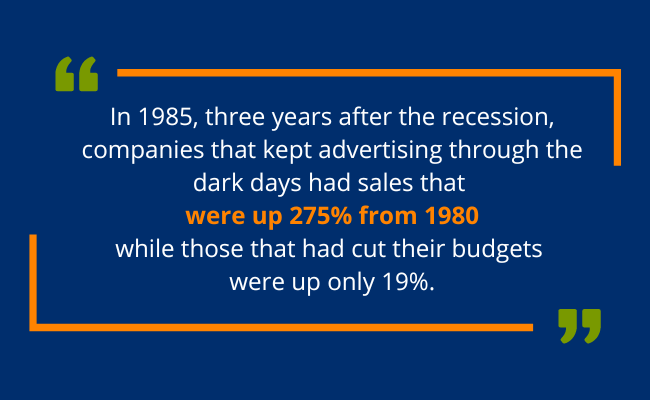
5. Improve the Effectiveness of your Digital Marketing Channels
If optimizing your marketing spend is the goal, your digital channels are a great place to start. Not only do digital channels offer incredible targeting options, a high level of measurability and reporting, and relatively affordable pricing, but they enable you to use data to drive your marketing investments.
As other companies roll back their PPC and digital advertising spending, the cost to take up that real estate tends to decrease.
Start by running an attribution analysis of your highest-value channels. Then, consider shuffling your budget around to take advantage of the relative quiet from your competitors.
There are a number of tactical strategies your business can implement to optimize your digital marketing investments without spending more money.
We asked some of our most tenured digital marketing strategists for advice on how to get more from your B2B marketing budget.
Here’s what we came up with:
How to Optimize Your B2B Marketing Budget in a Recession
1. Focus on Targeted Marketing:
When was the last time you took a deep dive into your marketing targeting? If it’s been a while, it’s time to dust off your reports and refocus your marketing efforts.
Targeted marketing has numerous benefits for your business. Why? This kind of marketing enables you to allocate your budget more efficiently by investing in those channels, platforms, and strategies that align most closely with your identified customer segments.
You already have access to valuable customer data. So why not use that to make your existing marketing efforts more targeted?
Start by reviewing your target market demographics, preferences, and behaviors. While refining your buyer personas may feel like a rudimentary task, it can be an invaluable step to your targeted marketing success - especially during a recession.
Remember, your buyer persona’s preferences may be quite different in a prosperous economy versus an unstable one.
Creating highly-targeted and personalized campaigns is key to optimizing your marketing strategy, improving customer engagement, and to achieving better results while ensuring efficient use of resources.
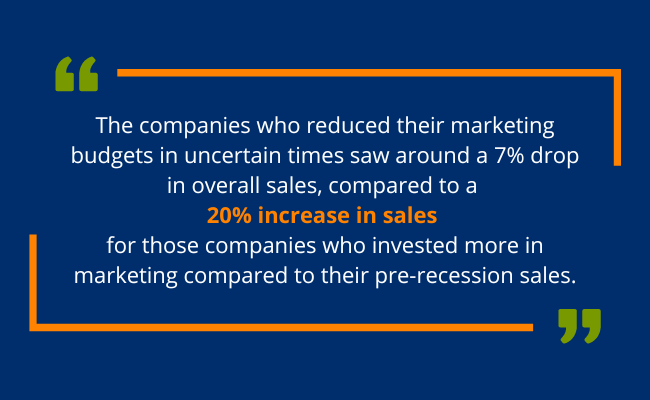
2. Optimize Your Digital Marketing Strategy
When the economy is uncertain, your digital marketing strategy doesn’t have to be.
Embracing all the facets of a digital marketing strategy can help you streamline, optimize, and maximize even the most humble of marketing budgets.
That’s because, unlike other channels, digital marketing offers a range of cost-effective channels and tactics - and not to mention targeted ROI data - so you’re getting the most bang for your buck.
Our advice?
Consider allocating a portion of their budget to proven B2B digital marketing strategies like: social media marketing, content marketing, search engine optimization (SEO), and email marketing.
With the right digital reporting tools in place, you can get real-time attribution data from your digital channels. This enables you to quickly and efficiently shift your marketing budget among channels. Not to mention, digital marketing is easy to scale, with a single campaign having multiple uses and applications across multiple channels.
Let’s talk about each of the digital marketing areas in more detail:
- Social media marketing: From your targeted research above, you should have a pretty good idea about where your ideal customers are spending their scrolling hours. Social media offers one of the most targeted approaches, especially in the B2B sector with LinkedIn and Facebook advertising. A savvy social strategy will allow you to engage directly with your target audience, build out your brand awareness, and drive website traffic. Platforms like Facebook, Instagram, Twitter, and LinkedIn offer robust targeting capabilities, enabling businesses to reach specific demographics, interests, and behaviors. Gone are the days where a few organic social posts can get you the eyes you need. Make sure you have a targeted, long-term social strategy in place to meet your customer’s changing needs.
- Content marketing: Your content marketing offers one of the most promising investments in a recession. Why? Because a savvy content strategy won’t just help you perform in the short term. Your blog posts, videos, and infographics can be optimized to provide exponential traffic value over time. Your content not only builds topic authority online, but it positions your business as a trusted resource, drives organic traffic to the website, and establishes thought leadership within the industry. In other words, it’s a win-win-win. Not to mention, your content marketing can be scaled using AI and then repurposed on other platforms including social media, SEO, and email marketing.
- Search engine optimization: Your content marketing is just one piece of your SEO strategy. And while SEO may be less immediately effective than some of the other strategies, there’s never a bad time to evaluate how your website is being searched for and found online. Small tweaks to your existing content can provide rapid ROI. Not to mention, a great SEO-guru will be skilled at scaling what’s already working well on your site - and applying what works great for your competitors.
- Email marketing: Yes, email marketing is still an incredibly effective strategy for B2B businesses. Especially for existing customer campaigns. Economic uncertainty provides a valuable opportunity for you to review your email templates, messaging, long-term nurtures, and personalization. Evaluate new opportunities to tweak your messaging. Evaluate the emails that lead to the most clicks and views to your site content. And then apply all of that data to a brandy-dandy new email marketing campaign to your targeted lists.
- Advertising campaigns: When your bottom line is at risk, it’s incredibly important to keep a close eye on your paid campaigns. Continuously monitor and optimize your ads to ensure maximum ROI. Dive deep into your ad analytics to make sure your cost per click is in the optimal range. And make sure your targeting, placements, designs, and messaging are tailored to your persona’s current needs. Recessions are a great time to consider a re-investment in pay-per-click (PPC) advertising because you have full control over your budget.
3. Collaborate with Strategic Marketing Partners
When optimizing your B2B marketing budget, outsourcing is probably pretty low on your list of priority expenses. But we’re here to prove that theory incorrect.All too often, in normal economies, marketing departments are disconnected from their general budget. When the budget becomes re-centered, it can be difficult to know which campaigns to stop, which campaigns to start, and which existing campaigns to amplify.
A recession is NOT the time to be experimenting.
By relying on a strategic partner with recession experience, you can take the guesswork out of your strategy. Your outsourced marketing firm can help you optimize your spend by zeroing in on proven campaign techniques and strategies. That’s because they have data and insight from tens of other companies in your same industry sector. They know what works - and what doesn’t.
That makes working with a strategic partner a high-value investment rather than another marketing expense.
Work with a company who cares as much about your budget as you do. Choose a partner that treats your marketing money like their own - like Conveyor Marketing Group! (Sorry for that shameless plug…)

4. Center Your Marketing Analytics
Data is critical to optimizing your B2B marketing budget. We really can’t stress that enough. While there’s always a time and place to try an innovative new strategy - a recession means you should be zeroing in on what’s already working well for your audience.
Start by evaluating your reporting tools.
Is everything set up correctly?
Are you able to use data to make informed marketing decisions?
Once your dashboards are cleaned up and are feeding you actionable data, it’s time to review your key performance indicators (KPIs) and attribution metrics, like:
- In the past six months, which content pieces on your site led to the most sales conversations?
- What pages on your site do people land on first?
- What social posts have the highest engagement and conversions?
- Which content offers represent the most downloads?
- Are your contact forms asking the right questions?
In uncertain times, your data can provide you with clarity into your marketing performance and goals.
Sometimes, it may make sense to increase spending in one area and decrease spending in another. But you won’t know for sure until you review your results.
5. Consider Giving Back
In tough times, it’s natural to reel your resources inward and focus back on your own business. But here at Conveyor Marketing Group, we’ve found that hard times are some of the best times to reach outward.
Not just for branding. But because it’s the right thing to do.
Our experience has always been that putting good out there brings good back in. When companies are hurting, individuals usually are too. Consider reaching out to local charities to share your insight, resources, expertise, or time. Not only will this help to put your marketing budget into perspective, but you might find that all that good karma comes back around when times are a little easier for everyone.
The future of digital marketing
We hope you found this article helpful. Our agency only hires tenured employees. It’s true! All of our strategists have years of experience in the B2B marketing industry. And that’s a crucial factor when deciding how to spend your marketing budget. We’ll never use your business as a learning experience for a fresh-out-of-college hire.
Want to learn more about how our team of marketing experts can optimize your digital strategy in 2023 and beyond? Contact us today!



